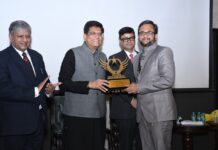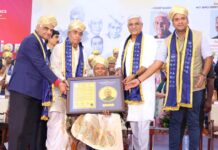New Delhi, January 29, 2020: In celebration of the International Day of Education, the UNESCO Mahatma Gandhi Institute of Education for Peace and Sustainable Development (MGIEP) hosted ‘A Dialogue with Gandhi’ in the capital today, featuring a highly interactive panel discussion with renowned experts and a life-size hologram of Mahatma Gandhi on ‘The Future of Education’.
The discussions revolved around the meaning of education in today’s world and measures that need to be undertaken if the United Nations (UN) Sustainable Development Goal (SDG) 4 – of ensuring ‘inclusive and equitable quality education’ and promoting ‘lifelong learning opportunities’ for all, are to be achieved. The panel also discussed the critical need to inculcate the emotional as well as cognitive aspects in our education systems to build competencies of empathy, compassion and kindness in the young – if they are to become citizens, who promote sustainable peace.
Ms. Najat Vallaud-Belkacem, former Minister of Education, France; Dr. Karan Singh, distinguished politician, philanthropist, poet and former Chair of the Governing Board, UNESCO MGIEP; and Kuany, Author and Associate Project Officer – Youth Programme, specializing in Prevention of Violent Extremism through Education (PVE-E) partook in the discussions with Gandhi focusing on the key competencies that need to be inculcated in education systems in pursuit of more peaceful and sustainable societies. The dialogue was moderated by Dr. Anantha Duraiappah, Director, UNESCO MGIEP. The event saw attendance by over 400 participants, including teachers, educators, students, academicians and policymakers.
The Dialogue was opened by Shri Ramesh Pokhriyal Nishank, Minister of Human Resource Development, Government of India, who highlighted the importance of promoting the Gandhian values of peace and non-violence to build a culture of sustainable peace in the world. Mr. Pokhriyal Nishank stated ‘’Academic success, while important, cannot be the end goal of our education system. Education must pursue a grander goal; an education for human flourishing. If real societal change is to be achieved, Gandhiji’s learnings will need to be built into our education systems and exemplified in our daily lives.’’
The panel discussion commenced with a standing hologram of Gandhi, who spoke for 7 minutes about the ideologies of Gandhi. Noting the current state of education, Ms. Belkacem observed ‘’Education systems today need to look beyond developing skills suited to the work force. We need to develop the emotional skills of our children and in this Gandhi’s teachings and practice of empathy, compassion, non-violence and emphasis on the truth, can be extremely beneficial for our education systems.’’
The talk, developed by the technical team of Mahatma Gandhi Digital Museum, was based on excerpts from Gandhi’s writings on Education, Satyagraha (the truth), Ahinsa (non-violence), Kindness and Critical Inquiry. While most people may only know Gandhi for his political views and writings, the hologram brought to light what Gandhi had to say about education.
Commenting on the dialogue series, Dr. Duraiappah expressed, “For a better future, we must not just focus on an education that builds human capital but human flourishing”. He further added, “Unless our present education systems embrace building emotional intelligence, we might end up in a world of highly literate people who are lacking in empathy and only concerned with their own wellbeing. This is not sustainable and will not build peaceful and sustainable societies.”
Further, Dr. Karan Singh, noted ‘’When we look at the state of the world today, we realise we need future leaders who are not just brilliant in their leadership and intellectual skills; instead we need emotionally resilient, kind, compassionate and empathetic leaders – leaders such as Gandhiji. How can we empower the young to emulate and practice the qualities Gandhiji stood so strongly for? I think our education systems can play an imperative role in introducing such qualities at a young age.’’
A unique aspect of the dialogue was a youth perspective on the panel. Kuany noted the qualities of Gandhi that inspired him, stating ‘’I bumped into the Mahatma almost a decade ago while striving to fill the emptiness of schooling through self-education. I took and ran with inquiry or experimentation and nonviolence from his corpus. My regret is that, up until then, my years in school had failed to equip me with the tools necessary to think for myself and curate values that would enable me to coexist harmoniously on this beautiful planet. I, therefore, thank Gandhi for the light and hope that the students of today and the future will not have to look back and regret the consequences of such an archaic, torturous, intellectually sedative and emotionally numbing experience that is most schooling.’’
The holographic avatar of Mahatma Gandhi was created using photo-mapped images of Gandhi from 1930-1940. A life-size wire frame of Gandhi was thereafter developed with advanced contouring software and 3D printing. Digital sculpting tools were used to add colour and texture to produce a real life image of Gandhi. The image was then animated and the voice lip synced to produce a colour hologram with advanced reprographic techniques. The process was curated by Birad Rajaram Yajnik along with the technical team of Mahatma Gandhi Digital Museums and was sponsored by Gandhi Smriti.
Organised by the UNESCO MGIEP, the dialogue was held in commemoration of the International Day of Education. A similar dialogue was held at the UNESCO Headquarters in Paris on the 150th birth anniversary of Gandhi.
Corporate Comm India(CCI Newswire)































